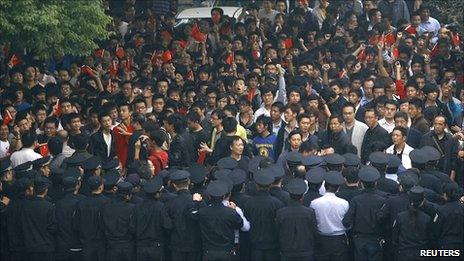Island disputes reveal Asia's evolving powers
- Published

The Diaoyu/Senkaku dispute has aroused tension in China and Japan
Over recent weeks some of the island chains that punctuate the Pacific Ocean off the mainland of Asia have provoked a series of diplomatic rows.
Japan has been at the centre of the disputes, falling out first with China in the wake of its arrest of a Chinese fishing captain near the contested islands known as Senkaku in Japan and Diaoyu in China.
Then it fell out with Russia; Japan protesting strongly this week over President Dmitry Medvedev's visit to the Kuril Islands, which Japan refers to as the Northern Territories. These were seized by Soviet troops in the closing stages of World War II but are still claimed by Japan.
A range of other island disputes flare up from time to time, notably in the South China Sea.
The motives are sometimes complex; economic concerns about competition for undersea oil or mineral rights are important in many cases; grand strategy plays a part too; and good old-fashioned nationalism is also often a factor.
Naval power
But behind the headlines, larger forces are at work. Countries in the region are trying to adjust to the reality of an ever more assertive China. The United States is eager to reassert its role as a Pacific power; and Russia too, though in some ways a less central player, is also eager to remain part of the Asian equation.
China, of course, is the great changing presence in the region. Its economic rise has been dramatic. Its future trajectory, though, remains uncertain. Until now a rising China has pursued a rather muted foreign policy, seeing its engagement with the world as a means of ensuring its economic success.
It has, for example, built a network of relationships around the globe to ensure that it has the access to the raw materials that its hungry economy requires.
However, now a new tone is creeping into China's engagement with the world. With success has come a new self-confidence; some might call it a new assertiveness. And this plays most strongly in its own backyard.
Its row with Japan focuses on the Diaoyu/Senkaku island chain which, in strategic terms, acts as a barrier or choke-point channelling the Chinese Navy's access to the wider ocean.
Beijing has made it clear that its maritime ambitions will not be contained in this way. It made it clear that Japan had to return its arrested sea captain straight away and Tokyo's rapid climbdown worried many other countries in the region.
China's growing naval power is a potent factor here as it develops a capacity to mount operations ever further from its own shores.
Dmitry Medvedev's recent visit to the Kurils stoked tensions with Tokyo
Indeed, the fact that Beijing appeared willing to employ an economic weapon in its row with Japan - the interruption of the supply of rare earth metals (though Beijing denies that it employed its economic muscle in this way) caused further unease, and not just in Asia.
This new Chinese assertiveness explains the efforts of President Barack Obama's administration to bolster its regional role.
US Secretary of State Hillary Clinton has been doing the rounds of key capitals in the wake of the East Asia summit in Hanoi and this is only a prelude to an increasingly important trip by President Obama himself this month.
Japan in particular is eager to bolster its maritime alliance with Washington. China is equally eager to limit US engagement, pointedly turning down a US offer to mediate between it and Japan over its latest high-seas spat.
The rising tensions in the region pose all sorts of problems for Washington.
It wants to reassure traditional friends and encourage new alliances, while not seeking to explicitly isolate Beijing.
This would be a nonsense given the close integration of China with America and the wider global economy.
We are still far from the world suggested by a spate of thriller novels perhaps a decade or so ago which saw an inevitable path to superpower conflict between Washington and Beijing.
Nonetheless the tensions are there and managing them will be a growing challenge for diplomats on all sides.
- Published1 November 2010
- Published29 April 2013
- Published10 November 2014
- Published24 September 2010